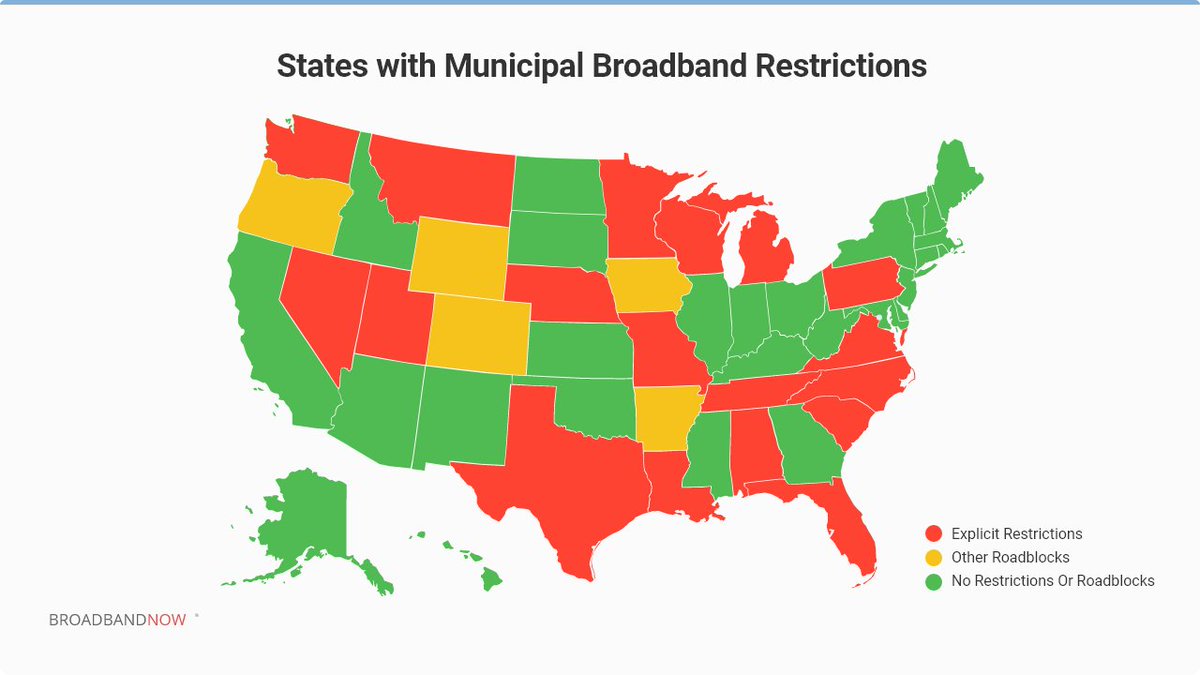When people discuss broadband inequality in the US, the conversation usually focuses on the 30 million Americans without access to high-speed internet.
But as crucial as that topic is, just as important are the untold millions more who have no access to *affordable* internet.
But as crucial as that topic is, just as important are the untold millions more who have no access to *affordable* internet.
It& #39;s hard to account for exactly how big this number is, since "technically accessible" and "realistically accessible" are very different benchmarks.
One Microsoft study concluded as many as 160 Million Americans go without broadband internet. https://www.nytimes.com/2018/12/04/technology/digital-divide-us-fcc-microsoft.html">https://www.nytimes.com/2018/12/0...
One Microsoft study concluded as many as 160 Million Americans go without broadband internet. https://www.nytimes.com/2018/12/04/technology/digital-divide-us-fcc-microsoft.html">https://www.nytimes.com/2018/12/0...
The barrier here is, of course, cost. While Americans can theoretically have access to some of be best internet speeds in the world, the OECD concluded this came at an average price of over $61 a month, far higher than most other industrialized nations.
(For reference, in the UK the average monthly price is ~$40 a month. Australia and Greece are about the same, Finland and Germany hover ~$30. In South Korea, you& #39;re paying $19.35)
https://www.oecd-ilibrary.org/science-and-technology/access-network-speed-tests_5jz2m5mr66f5-en">https://www.oecd-ilibrary.org/science-a...
https://www.oecd-ilibrary.org/science-and-technology/access-network-speed-tests_5jz2m5mr66f5-en">https://www.oecd-ilibrary.org/science-a...
Mostly, this can get chalked up to lack of competition. In most of America, there& #39;s only one ISP in town to choose from, so the cost of internet is just whatever they decide it& #39;s going to be. And the further you are from a major city, the less likely they are to cut you a deal.
What& #39;s important is that there *are* alternatives to this set up. If you follow this page, you know we& #39;re fans of @SpaceXStarlink, but competitors like OneWeb or Project Kuiper can be just as helpful in leveling the playing field for rural communities. https://triblive.com/local/regional/extraterrestrial-solution-elon-musk-starlink-look-to-the-stars-to-fill-internet-broadband-gaps-including-across-western-pennsylvania/">https://triblive.com/local/reg...
A *slightly* less space-age solution, meanwhile, would be municipal internet. In 2009, Chattanooga invested $300 million in building a municipal fiber optic network. As a result, "Gig City" was named the best city to work from home in 2021 by @PCMag. https://www.pcmag.com/news/the-best-work-from-home-cities-for-2021/chattanooga-tn">https://www.pcmag.com/news/the-...
Unfortunately, 18 states currently have laws restricting the formation of municipal broadband services, and another five have enough implicit roadblocks to make implementing them essentially impossible. It& #39;ll be hard to level the playing field until they& #39;re lifted.
There& #39;s support all across the political spectrum to make changes to remedy most of these problems and make affordable high-speed internet a reality from coast to coast, but it& #39;s up to all of us to make sure it stays a priority rather than a pipe dream.
And if we stay focused, and hold enough feet to the fire to make sure those broadband dreams come true, hopefully someday everyone in America will be able to watch the Speddify #ClockStream in the HD quality it was meant for. https://www.twitch.tv/speedifyofficial">https://www.twitch.tv/speedifyo...

 Read on Twitter
Read on Twitter


